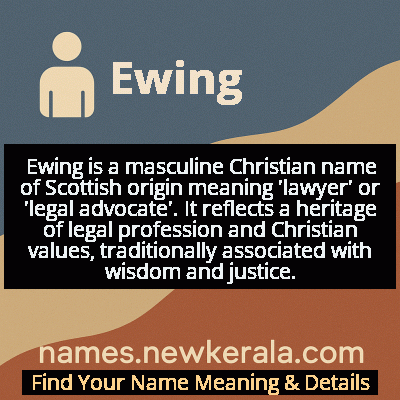Ewing Name Meaning & Details
Origin, Popularity, Numerology Analysis & Name Meaning of Ewing
Discover the origin, meaning, and cultural significance of the name EWING. Delve into its historical roots and explore the lasting impact it has had on communities and traditions.
Name
Ewing
Gender
Male
Origin
Christian
Lucky Number
4
Meaning of the Name - Ewing
Ewing is a masculine Christian name of Scottish origin meaning 'lawyer' or 'legal advocate'. It reflects a heritage of legal profession and Christian values, traditionally associated with wisdom and justice.
Ewing - Complete Numerology Analysis
Your Numerology Number
Based on Pythagorean Numerology System
Ruling Planet
Uranus (Rahu)
Positive Nature
Strong sense of order, loyal, practical, and disciplined.
Negative Traits
Stubborn, overly serious, rigid, and prone to feeling restricted.
Lucky Colours
Blue, gray.
Lucky Days
Saturday.
Lucky Stones
Blue sapphire.
Harmony Numbers
1, 7, 8.
Best Suited Professions
Managers, engineers, accountants, organizers.
What People Like About You
Dependability, discipline, practicality.
Famous People Named Ewing
Ewing Kauffman
Pharmaceutical Entrepreneur and Sports Team Owner
Founded Marion Laboratories and owned the Kansas City Royals baseball team
Ewing Y. Mitchell
Politician and Lawyer
Served as U.S. Representative from Missouri and prominent attorney
Ewing Laporte
Architect
Notable New York architect who designed several landmark buildings
Ewing Werlein Jr.
Federal Judge
Served as United States District Judge for the Southern District of Texas
Name Variations & International Equivalents
Click on blue names to explore their detailed meanings. Gray names with will be available soon.
Cultural & Historical Significance
During the Scottish Reformation and subsequent periods, many Ewings maintained their Christian faith while serving in legal capacities, creating a unique blend of religious devotion and professional legal practice that characterized the name's cultural identity for centuries. The Ewing family played important roles in both religious and civic life, often serving as elders in the Presbyterian Church while also holding legal positions. This dual role reinforced the name's connection to both Christian values and legal authority, making it a name that symbolized moral integrity combined with practical wisdom in Scottish and Irish communities.
Extended Personality Analysis
Individuals named Ewing are typically perceived as analytical, principled, and intellectually rigorous. They often exhibit strong problem-solving abilities and a natural inclination toward justice and fairness, reflecting the name's historical legal associations. Ewings tend to be methodical in their approach to challenges, demonstrating patience and thoroughness in their endeavors. Their communication style is often precise and well-reasoned, making them effective in positions requiring clear judgment and logical thinking.
Many Ewings display a strong sense of responsibility and reliability, combined with a quiet confidence that inspires trust in others. They often balance traditional values with progressive thinking, creating a personality that respects heritage while embracing innovation. Their Christian background frequently manifests in strong moral compass and ethical decision-making, though they typically avoid overt displays of religiosity in favor of practical application of their beliefs. This combination of traits makes Ewings particularly effective in leadership roles where integrity, wisdom, and fair judgment are valued, whether in professional settings or within their communities.
Modern Usage & Popularity
In contemporary times, Ewing maintains a distinguished presence as a first name, though it remains relatively uncommon compared to more popular choices. Its usage has seen a modest resurgence in recent years, particularly among families with Scottish or Irish heritage seeking to honor their ancestry. The name appeals to parents looking for traditional yet distinctive masculine names that convey strength and intelligence. While not ranking in the top 1000 names in most English-speaking countries, Ewing enjoys steady usage in legal and academic circles, where its professional connotations are appreciated. Modern Ewings often work in law, finance, education, and technology, continuing the name's association with intellectual pursuits and professional achievement. The name's rarity in modern times adds to its appeal for parents seeking unique but meaningful names with historical depth and professional prestige.
Symbolic & Spiritual Meanings
Symbolically, Ewing represents the enduring values of justice, wisdom, and integrity. The name evokes images of ancient legal traditions and Christian moral foundations, symbolizing the bridge between faith and reason. Like the yew tree from which it may derive etymologically, Ewing symbolizes longevity, resilience, and deep-rooted strength. The name carries connotations of protection and advocacy, reflecting its historical role in legal defense and representation. In metaphorical terms, Ewing suggests a person who serves as a pillar of their community—someone who upholds principles while navigating complex social structures. The name also symbolizes the balance between tradition and progress, honoring heritage while embracing contemporary challenges with wisdom and discernment. This symbolic richness makes Ewing a name that conveys both historical weight and contemporary relevance.

